Art and action in the films of King Hu
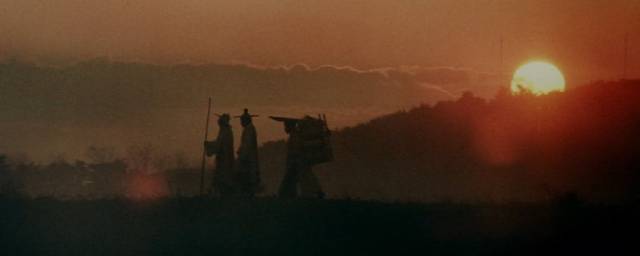
in King Hu’s Raining in the Mountain (1979)
Thanks to Masters of Cinema and 88Films in England I’m getting close to a complete collection of King Hu’s major features. The most recent releases on Blu-ray are Hu’s breakthrough Shaw Brothers movie Come Drink With Me (1966) and Raining in the Mountain (1979), Hu’s last great film before a lingering decline. Although not his actual first and last films, they do form interesting bookends to his strongest work.
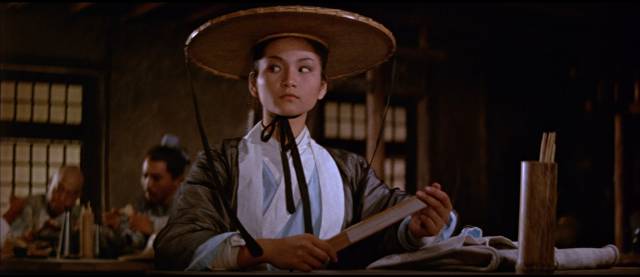
Come Drink With Me (1966)
An actor and production designer, King Hu turned to directing in his early thirties, but it was with his fourth feature in 1966 that he not only found his niche, he completely reinvented a moribund genre and transformed Hong Kong cinema. Chinese swordplay movies, wuxia pian, had been around almost since the beginning, but they tended towards fantasy. Hu tempered the fantastic with a sense of historical reality, replacing magic with acrobatic action influenced by Peking Opera. A trace of magic does appear towards the end of Come Drink With Me, but it metamorphoses in subsequent films into Buddhist mysticism, a spiritual force which gives power to the martial arts.
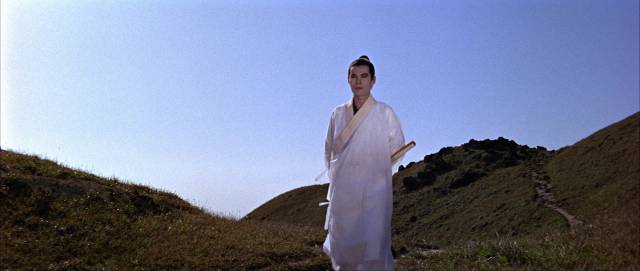
Come Drink With Me, which launched a decade of period martial arts movies (eventually supplanted by kung fu movies following the popularity of Bruce Lee), was the first of Hu’s “inn” movies (followed by Dragon Gate Inn and The Fate of Lee Khan), largely set in and around a social space inhabited by characters representing every class, many in disguise, who are engaged in complex plots; rebels disguised as beggars, women disguised as men, secret documents which may enable or end plans to overthrow oppressive authorities…
The film begins with a sense of panoramic scale as an orderly column of soldiers accompanying a palanquin is stopped by a man on a hilltop path. This man, Jade-Faced Tiger (Chan Hung-lit), demands that a message be sent to the region’s military commander to release the imprisoned leader of an outlaw gang. When the demand is refused, the column is suddenly surrounded by the rest of the gang and everyone slaughtered except for the general’s son (Wong Chung) who is riding in the palanquin. He’s taken hostage, to be exchanged for the gang leader.
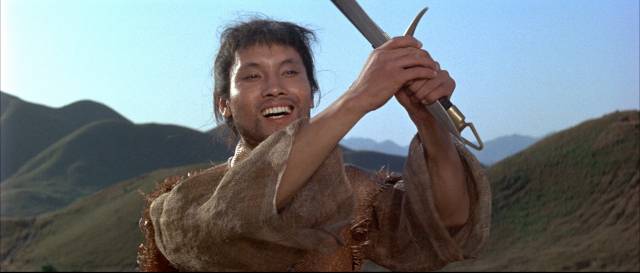
After this large-scale action scene, we find ourselves at an inn, where Jade-Faced Tiger and his men are hanging out. A well-dressed stranger arrives – here, we have to accept one of the genre’s common tropes, which would have been more easily accepted on the Opera stage, but has to be taken on faith on the screen: a woman unconvincingly disguised as a man, whose disguise none of the characters is able to see through. This is Golden Swallow (Cheng Pei-pei), the first of Hu’s many strong female characters. When the gang discover that the stranger is their hostage’s “brother”, a fight ensues and Golden Swallow easily kicks their butts. She has the well-concealed help of a drunken beggar, though, who seems to accidentally get in the gang members’ way at opportune moments.
The beggar is Drunken Cat (Yuen Hua), something of a guardian angel for Golden Swallow. He tells her that the gang is hiding out at a nearby monastery. When she goes there to confront the gang, there’s another fight and Jade-Faced Tiger manages to wound her with a poison dart. Drunken Cat nurses her back to health, and during her recovery she finds out that he’s a kung fu master – what’s more, he once belonged to a martial arts school with Liao Kung (Yeung Chi-hing), the abbot of the monastery, who had killed their master to get possession of the sifu’s bamboo staff – which Drunken Cat now carries.
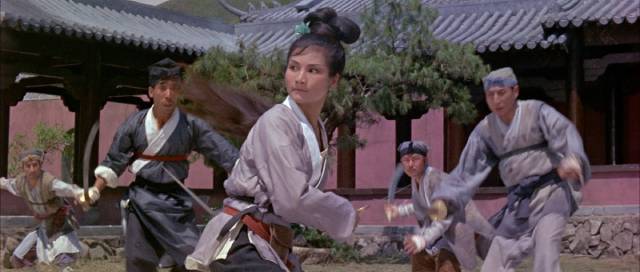
The action now follows two lines: Golden Swallow’s mission to rescue her brother and the resolution of the long-standing conflict between Drunken Cat and Liao Kung. It is during the final exchange of prisoners that the mystical power of kung fu shows up as Drunken Cat and Liao Kung start blasting each other with chi in the form of strong winds blowing from their hands. This is the first, crude appearance of the forces which take over the almost abstract battle in the final stretch of A Touch of Zen (1971).
Come Drink With Me lays down the visual vocabulary which was used by numerous filmmakers following Hu’s example over the next decade and beyond. With wire work still in the future, Hu used trampolines, judicious camera placement and rapid editing to give the appearance of gravity-defying agility to the fights – a real innovation given the tendency at the time to film fights in wide shots whose purpose was to display the performers’ martial arts skills rather than create dramatic effects to further the narrative. Hu invested the genre with cinematic style and visceral energy.
*
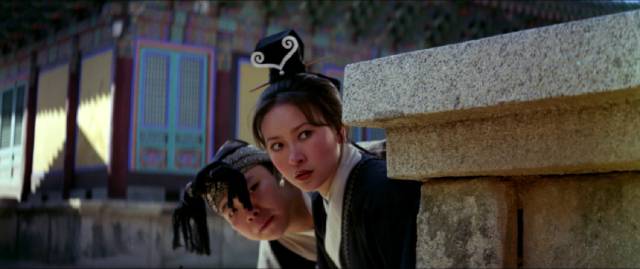
Raining in the Mountain (1979)
Made back-to-back with Legend of the Mountain in Korea, Raining in the Mountain (1979) seems to be the last of King Hu’s great films. I haven’t seen everything he made over the next decade-plus, but his final two features can’t match his work in the ’60s and ’70s. Although Tsui Hark provided a late opportunity with The Swordsman (1990), things didn’t work out and Hu was essentially fired, with the film ending up with four directors patching it together into an entertaining, old-fashioned wuxia pian which was not recognizable as Hu’s work; and the less said about the hugely disappointing Painted Skin (1992) the better.
Like Legend, Raining in the Mountain is a meditation on the connections between the physical and spiritual realms, but unlike that exquisite ghost story, it eschews the supernatural. Set in a huge Buddhist temple, it focuses on material concerns in a place devoted to the spirit. The aging Abbot (Kim Chang-gean) is preparing to name his successor, choosing from three of the senior monks. To help make the decision, he has summoned Esquire Wen (Sun Yueh), a wealthy benefactor, and General Wang (Tien Feng), the region’s civil authority, to advise him.
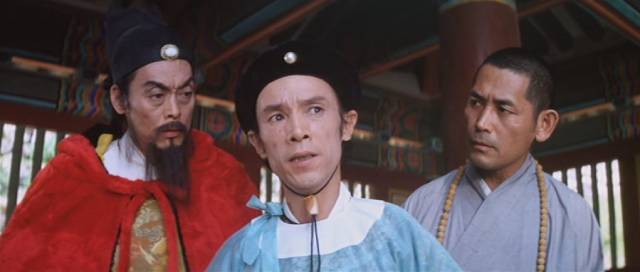
Both the Esquire and the General have ulterior motives – in fact, the same ulterior motive; both want to acquire a famed, priceless scroll from the temple’s library. Each is backing a particular candidate, having been assured that the scroll will be theirs once their candidate is in power. But neither is willing to trust to chance, and both are plotting to steal the scroll.
Esquire Wen is accompanied by a woman he says is his new concubine, but who is actually a master thief, White Fox (Hsu Feng). The General has brought his cruel, scheming enforcer Chang Cheng (Chen Hui-lou), and as the deliberations about the succession continue, these factions wage an underground battle to beat each other to the prize.
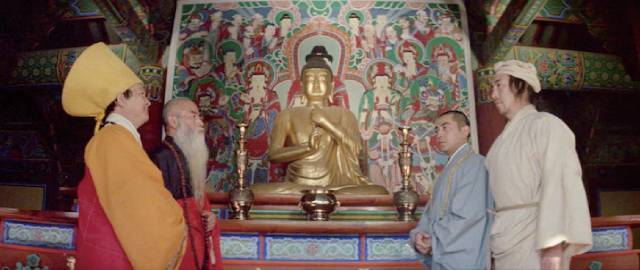
One other complication arises with the arrival of Chiu Ming (Tung Lin), a condemned man who has opted to serve his sentence as an acolyte at the temple. Under questioning by the Abbot, Chiu tells of being falsely accused of theft by Chang Cheng, who engineered the trial in order to steal from Chiu and his brother, the latter being beaten to death in custody. During this questioning it becomes apparent that Chiu bears no animosity and seeks no revenge; he is resigned to his fate and accepts it calmly. The Abbot assigns him to menial tasks, which he accepts with equanimity.
However, when he sees Chang attacking White Fox, he intervenes; accusations are made and punishment given … but still he shows no anger or animosity. It comes as no real surprise late in the film when the Abbot – having tested the three candidates, all of whom respond impeccably with obvious political calculation – names Chiu as his successor, a raw peasant intelligence with innate spiritual wisdom. Chiu quickly adapts to his new responsibilities as one of the other candidates foments rebellion among the acolytes and another attempts to assassinate him.
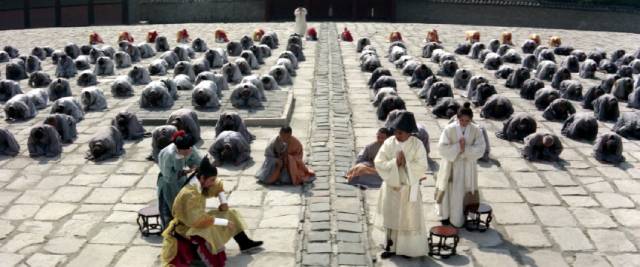
As he quells these problems, he also solves the issue of conflict resulting from the presence of the valuable scroll in the temple: he has multiple copies made and burns the original – after all, it’s the wisdom contained in it that matters, while the specific material qualities of the original serve only to inspire greed and violence.
I may simply be too unaware of cultural nuances – it’s certainly not mentioned in David Cairns’ video essay on the disk or the essays in the accompanying booklet – but to me there seems to be a great deal of humour in Raining in the Mountain. The activity of White Fox and Chang Cheng, with their constant sneaking about the temple, plays almost like a classic bedroom farce, with close encounters, split-second evasions and missed connections. Although the plot is complicated, Hu treats much of it in a throwaway manner, more interested in the elaborate choreography of the characters’ movements than the thwarting of the various criminal schemes. The film seems to find the lengths to which people go for material gain absurd, with the Abbot’s selection of Chiu mocking the ambitions of the candidates and rebuking the venal plots of the Esquire and the General.
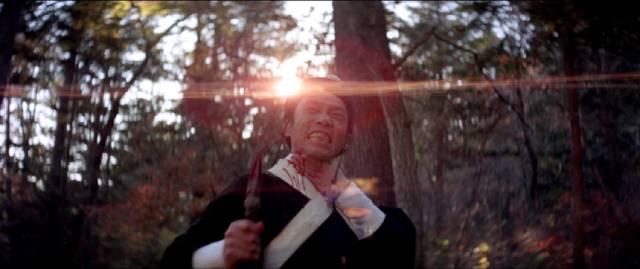
There are a couple of fight scenes, but the film’s real pleasures lie in its construction and exploration of physical space and the ways in which the characters navigate the complex labyrinth of the temple and finally emerge into a forest where their greed blinds them to the beauty of the world and drives them to fight and kill one another for the scroll … those sudden moments of death come as a real shock as they puncture the dominant tone which paradoxically combines the busy-ness of futile action with a languid sense of timelessness.
*
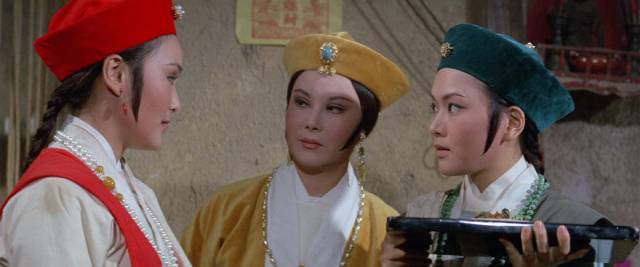
As in so many of Hu’s films, the focal point of both Come Drink With Me and Raining in the Mountain is a powerful female character, whose sense of agency denies the would-be dominance of arrogant men. Cheng Pei-pei and Hsu Feng push back with seemingly effortless grace against the genre’s usual male-centred narratives, their presence an inspiration to actors like Brigitte Lin, Maggie Cheung and Michelle Yeoh, and a lasting influence on filmmakers who built on Hu’s work, like Wong Kar-wai in his magnificent Ashes of Time (1994) and Ang Lee in his popular hit Crouching Tiger, Hidden Dragon (2000).
Both disks have transfers which support Hu’s rich image-making while reflecting flaws in the source materials. Raining in particular is inconsistent, having been restored using a number of different sources, making it slightly less satisfying than the other King Hu disks from Masters of Cinema. Both films have commentaries – Samm Deighan on Come Drink With Me and Tony Rayns on Raining in the Mountain (I haven’t yet listened to either so perhaps Rayns confirms my impression of the comic tone of Raining … or not). As mentioned, David Cairns contributes a 21-minute video essay which explores King Hu’s visual style, and each disk comes with a booklet containing critical essays.
*
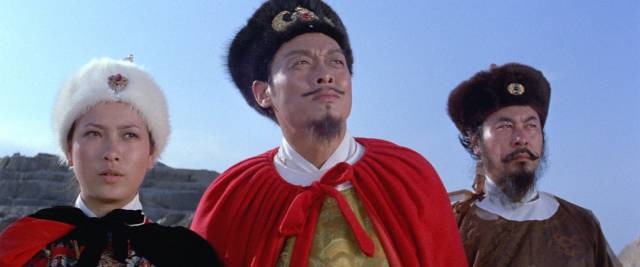
in King Hu’s The Fate of Lee Khan (1973)
Addendum: The Fate of Lee Khan (1973)
Watching and writing about these films reminds me that I didn’t get around to commenting on Hu’s The Fate of Lee Khan when I watched it (for the first time) back in January. After the commercial success of Come Drink With Me and Dragon Gate Inn, Hu stretched with the hugely ambitious A Touch of Zen, which went way over budget and over schedule, only to fail at the box office in 1971. Between that disappointing release and the later validation the film received at Cannes in 1975, Hu went back to first principles, but with a vengeance. The Fate of Lee Khan is scaled back, but it concentrates the genre into its essence in terrifically entertaining ways.
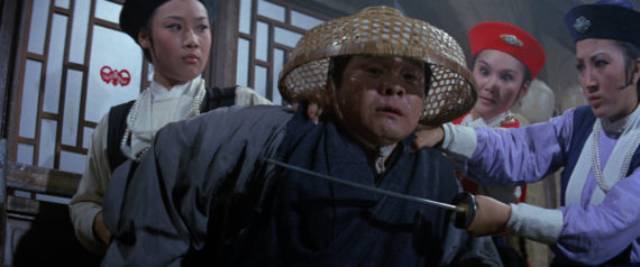
Until the final act – a protracted martial arts battle in a dry, rocky landscape – the film is confined to the interior of the Spring Inn, populated by a lot of shady characters whose identities are gradually revealed as the story unfolds. With China under the oppressive Mongol Yuan Dynasty, a rebellion is building; the existence of a map outlining the rebel plans is the McGuffin for a fast, dense, exciting plot which begins with a lot of humour but grows darker as it progresses.
When word arrives that brutal Mongol warlord Lee Khan (Tien Feng) is due to arrive at the inn to claim the map, innkeeper Wan Jen-mi (Li Li-hua) “hires” four rebels as her new waitresses. The early stretch of the film spends a lot of time on these women dealing with lecherous customers, cheating gamblers and various other men who may or may not be involved in the on-going espionage surrounding the map. Small skirmishes provide opportunities for comic fight scenes, but the as-yet unseen Lee Khan casts a darkening shadow over the inn.
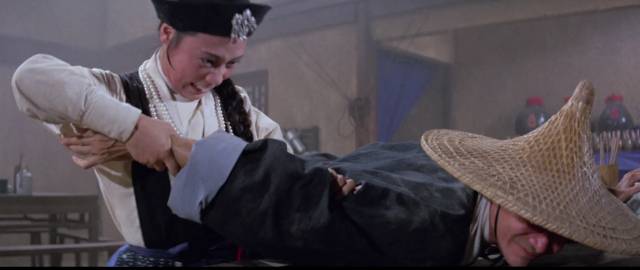
When he finally does arrive, accompanied by an entourage which includes his ruthless sister Lee Wan-ehr (Hsu Feng, naturally), the tone changes; the violence becomes real and danger creates palpable tension which builds relentlessly towards that climactic protracted fight in the desert which leaves many of the characters dead.
There’s also a change in the style of the fighting, away from the elegant, exaggerated dance-like choreography of the earlier films, towards the more commercial style of mainstream martial arts movies – a blending of Hu’s poetry with more visceral action, attributable to the hiring of Sammo Hung as the action director. Which is definitely not to say that Hu surrendered to commercial dictates by making the film as a mere excuse for the fights; as in his previous work, the fights are organically embedded in a well-constructed drama, growing out of the narrative rather than dominating it.
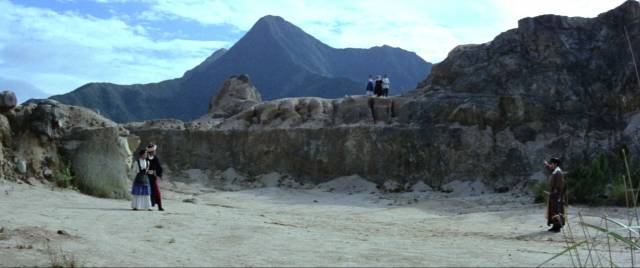
It’s almost as if, having ambitiously expanded the genre with A Touch of Zen, he needed to prove that he was capable of making a commercial film without sacrificing his art. (He shot Lee Khan back-to-back with another more conventional film, The Valiant Ones, which I still haven’t seen.) After his success at Cannes with A Touch of Zen, there was a break of several years before Hu resumed his more ambitious expansion of genre possibilities with Legend of the Mountain and Raining in the Mountain.
Released in a dual-format edition by Masters of Cinema, The Fate of Lee Khan looks gorgeous on disk. As with Raining in the Mountain, there’s a Tony Rayns commentary and a video essay by David Cairns.
Comments